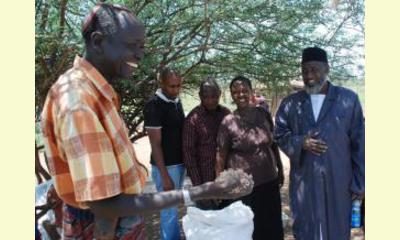|
|
Initiative for Land, Lives and Peace in Baringo County, Kenya
un article par Initiatives of Change International
Cattle-rustling is described by Kenya’s national
press as ‘a great menace’. In February this year,
three police officers were killed by cattle
rustlers in Baringo County. Last November, forty
police went on a mission to retrieve stolen cattle
in Samburu County. They tracked the armed raiders
into a remote valley, where they were ambushed.
All forty police officers were shot dead.

Joseph Kwopin with grass seed. Imam Muhammad Ashafa looks on. (Photo: Alan Channer)
click on photo to enlarge
Cattle-rustling is a symptom of a complex web of
inter-related problems that affect the semi-arid
regions of Kenya, which cover more than two thirds
of the country’s surface area. Drought, population
pressure, land degradation and easy access to
automatic weapons are an explosive combination.
Pastoralist ways of life are under threat and a
vicious circle is in force: insecurity and
conflict hamper development, yet development is
key to resolving insecurity and conflict.
A significant breakthrough took place in Baringo,
in April 2012, during a two day meeting
facilitated by the ‘Land, Lives, Peace’ programme
of Initiatives of Change International.
(Click here for report of this event)
Community leaders from the Pokot, Ilchamus and
Tugen – the three largest ethnic groups in Baringo
– resolved to co-operate and to form an inter-
ethnic ‘peace committee’.
Also at the meeting was Paul Parsalaach,
Operations Manager of the Baringo-based
‘Rehabilitation of Arid Environments (RAE) Trust’.
Parsalaach explained how some of the RAE Trust’s
land restoration projects, which have the
potential to improve the livelihoods of
pastoralist communities dramatically, were failing
because of inter-ethnic conflict.
The breakthrough was captured by IofC’s FLTfilms in
a short film entitled ‘Transforming Land,
Transforming Lives in Baringo County, Kenya’. The
film can be viewed on the website of the
United Nations Convention to Combat
Desertification.
With a new-found volition to work together for
peace, nine community leaders from Baringo
participated in a training of grass-roots
practitioners, in November 2012, given by
internationally renowned peacemakers Pastor James
Wuye and Imam Muhammad Ashafa. This training is
part of a project to ‘transfer the peace-building
methodologies depicted in the film An African
Answer’. It is supported by the United States
Institute of Peace and IofC UK and implemented by
FLTfilms and IofC Kenya.
During the workshop the Baringo team came up with
a shared vision and an action plan to end cattle-
rustling in their county. (Click
here to read this story).
The team then won national attention. They were
selected by the Independent Electoral and
Boundaries Commission of Kenya to serve as
independent observers of Kenya’s national
elections in March. They received training for
this from a joint UNDP/EU/Japanese programme
supporting the electoral process.
With increased confidence, the team brought
together retired chiefs from the three communities
to look at how they might seal an end to conflict
between them. The team are looking now at how to
bring healing and reconciliation. They are also
looking at how to improve the livelihoods of their
communities – livelihoods which revolve around key
resources of water and grass.
(This article is continued in the discussionboard)
|








|
DISCUSSION
Il n'y pas encore de question liée à cet article.
* * * * *
Commentaire le plus récent:
(The following is continued from the main article listed above.)
Once again ‘Initiatives for Land, Lives, Peace’ (ILLP) served as a key connector, linking the Baringo team to Excellent Development a UK and Kenya-based charity which trains communities to build sand dams. Sand dams are reinforced concrete walls installed in seasonal riverbeds - of which there are many in Baringo. The technique creates a higher riverbed, which then acts like a sponge to store water through the dry season.
Zephania Lekachuma, the Area Chief of Marigat town, from the Ilchamus community, together with Mary Kuket, a Pokot community leader, attended a training in sand dam construction from May 12-17 in southeastern Kenya.
Eager to take the whole move to resolve cattle-rustling up another gear, the Baringo team hosted a visit by Imam Muhammad Ashafa and Pastor James Wuye from May 17-20, together with the USIP/IofC project co-ordination team Dr Alan Channer, Joseph Karanja and Steve Kimaru.
They were received by the Deputy Governor of Baringo County, Mathew Tuitoek, in Kabarnet Town Hall for a one hour meeting. ‘Without peace,’ stressed Deputy Governor Tuitoek, ‘we cannot have development in this county’.
The visitors were taken by Maryann Lekisemon, founder of the local NGO 'Community Centre for Peace and Development', to a community of Ilchamus IDPs (‘Internally Displaced Persons’), who fled from their homes after their cattle were stolen by
Pokot raiders. The group sat on the dry ground, under a tall acacia tree. Imam Ashafa and Pastor Wuye shared their experiences of enmity and forgiveness. Pastor Wuye showed where his arm had been cut off by Imam Ashafa's enemy militia. ‘Our prayer is that you will return home,’ he said. . ... continuation.

|
|









